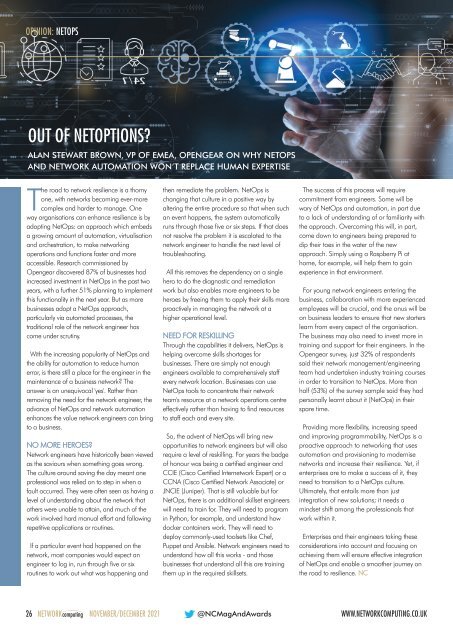NC Nov-Dec 2021
Create successful ePaper yourself
Turn your PDF publications into a flip-book with our unique Google optimized e-Paper software.
OPINION: NETOPS<br />
OUT OF NETOPTIONS?<br />
ALAN STEWART BROWN, VP OF EMEA, OPENGEAR ON WHY NETOPS<br />
AND NETWORK AUTOMATION WON’T REPLACE HUMAN EXPERTISE<br />
The road to network resilience is a thorny<br />
one, with networks becoming ever-more<br />
complex and harder to manage. One<br />
way organisations can enhance resilience is by<br />
adopting NetOps: an approach which embeds<br />
a growing amount of automation, virtualisation<br />
and orchestration, to make networking<br />
operations and functions faster and more<br />
accessible. Research commissioned by<br />
Opengear discovered 87% of businesses had<br />
increased investment in NetOps in the past two<br />
years, with a further 51% planning to implement<br />
this functionality in the next year. But as more<br />
businesses adopt a NetOps approach,<br />
particularly via automated processes, the<br />
traditional role of the network engineer has<br />
come under scrutiny.<br />
With the increasing popularity of NetOps and<br />
the ability for automation to reduce human<br />
error, is there still a place for the engineer in the<br />
maintenance of a business network? The<br />
answer is an unequivocal 'yes'. Rather than<br />
removing the need for the network engineer, the<br />
advance of NetOps and network automation<br />
enhances the value network engineers can bring<br />
to a business.<br />
NO MORE HEROES?<br />
Network engineers have historically been viewed<br />
as the saviours when something goes wrong.<br />
The culture around saving the day meant one<br />
professional was relied on to step in when a<br />
fault occurred. They were often seen as having a<br />
level of understanding about the network that<br />
others were unable to attain, and much of the<br />
work involved hard manual effort and following<br />
repetitive applications or routines.<br />
If a particular event had happened on the<br />
network, most companies would expect an<br />
engineer to log in, run through five or six<br />
routines to work out what was happening and<br />
then remediate the problem. NetOps is<br />
changing that culture in a positive way by<br />
altering the entire procedure so that when such<br />
an event happens, the system automatically<br />
runs through those five or six steps. If that does<br />
not resolve the problem it is escalated to the<br />
network engineer to handle the next level of<br />
troubleshooting.<br />
All this removes the dependency on a single<br />
hero to do the diagnostic and remediation<br />
work but also enables more engineers to be<br />
heroes by freeing them to apply their skills more<br />
proactively in managing the network at a<br />
higher operational level.<br />
NEED FOR RESKILLING<br />
Through the capabilities it delivers, NetOps is<br />
helping overcome skills shortages for<br />
businesses. There are simply not enough<br />
engineers available to comprehensively staff<br />
every network location. Businesses can use<br />
NetOps tools to concentrate their network<br />
team's resource at a network operations centre<br />
effectively rather than having to find resources<br />
to staff each and every site.<br />
So, the advent of NetOps will bring new<br />
opportunities to network engineers but will also<br />
require a level of reskilling. For years the badge<br />
of honour was being a certified engineer and<br />
CCIE (Cisco Certified Internetwork Expert) or a<br />
CCNA (Cisco Certified Network Associate) or<br />
J<strong>NC</strong>IE (Juniper). That is still valuable but for<br />
NetOps, there is an additional skillset engineers<br />
will need to train for. They will need to program<br />
in Python, for example, and understand how<br />
docker containers work. They will need to<br />
deploy commonly-used toolsets like Chef,<br />
Puppet and Ansible. Network engineers need to<br />
understand how all this works - and those<br />
businesses that understand all this are training<br />
them up in the required skillsets.<br />
The success of this process will require<br />
commitment from engineers. Some will be<br />
wary of NetOps and automation, in part due<br />
to a lack of understanding of or familiarity with<br />
the approach. Overcoming this will, in part,<br />
come down to engineers being prepared to<br />
dip their toes in the water of the new<br />
approach. Simply using a Raspberry Pi at<br />
home, for example, will help them to gain<br />
experience in that environment.<br />
For young network engineers entering the<br />
business, collaboration with more experienced<br />
employees will be crucial, and the onus will be<br />
on business leaders to ensure that new starters<br />
learn from every aspect of the organisation.<br />
The business may also need to invest more in<br />
training and support for their engineers. In the<br />
Opengear survey, just 32% of respondents<br />
said their network management/engineering<br />
team had undertaken industry training courses<br />
in order to transition to NetOps. More than<br />
half (53%) of the survey sample said they had<br />
personally learnt about it (NetOps) in their<br />
spare time.<br />
Providing more flexibility, increasing speed<br />
and improving programmability, NetOps is a<br />
proactive approach to networking that uses<br />
automation and provisioning to modernise<br />
networks and increase their resilience. Yet, if<br />
enterprises are to make a success of it, they<br />
need to transition to a NetOps culture.<br />
Ultimately, that entails more than just<br />
integration of new solutions; it needs a<br />
mindset shift among the professionals that<br />
work within it.<br />
Enterprises and their engineers taking these<br />
considerations into account and focusing on<br />
achieving them will ensure effective integration<br />
of NetOps and enable a smoother journey on<br />
the road to resilience. <strong>NC</strong><br />
26 NETWORKcomputing NOVEMBER/DECEMBER <strong>2021</strong> @<strong>NC</strong>MagAndAwards<br />
WWW.NETWORKCOMPUTING.CO.UK

















